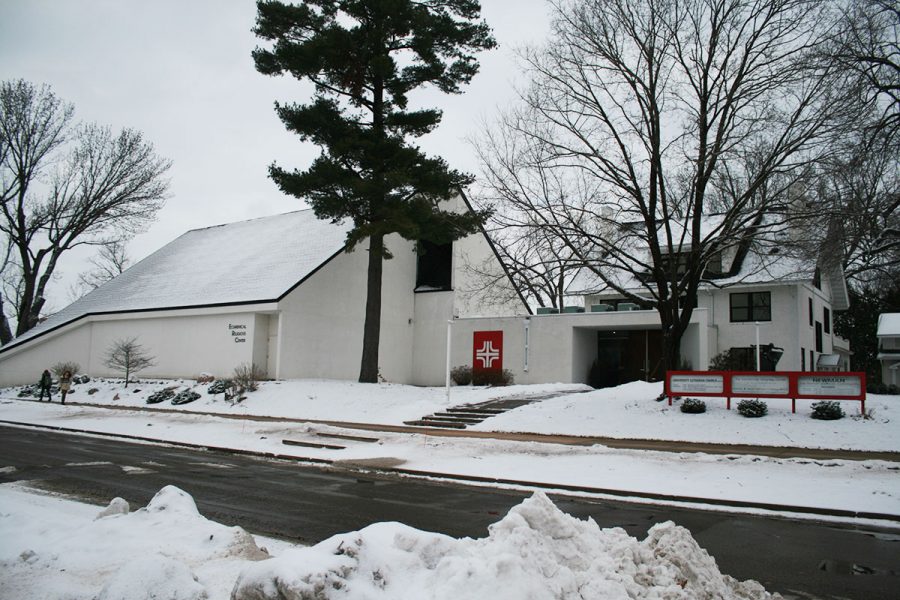Two UW-Eau Claire students sue for violation of constitutional rights
UW-Eau Claire Officials decide to settle lawsuit over Service-Learning Policy
More stories from Rachyl Houterman
Photo by Submitted
Newman Parish, the Roman Catholic Church at which Liebl and Rysavy completed their community service. The church is located on Garfield Ave. next to Hibbard Hall.
UW-Eau Claire is settling a civil lawsuit filed against the school by two students and a Christian legal group, Alliance Defending Freedom, after the students were refused credit for their service-learning hours completed at a local Roman Catholic church.
On Jan. 23 a “settlement in principle” had been reached, which stated both parties had been working “diligently” in the previous weeks and “are confident that a final settlement agreement will be executed in the very near future.”
Director of Communications and Public Affairs for the Department of Justice, Johnny Koremenos, told the Leader Telegram, “Both sides agreed this matter could be resolved outside the courtroom.”
Travis Barham, an attorney at Alliance Defending Freedom of Lawrenceville, Georgia and representative of the plaintiffs, said the details have yet to be worked out, but he’s hopeful a settlement will be reached within the next month.
Assistant Attorney General, Steven Kilpatrick, represents the university in the case and did not immediately respond for questioning on the settlement.
The lawsuit was filed on Nov. 10, 2016 after Eau Claire students Alexandra Liebl and Madelyn Rysavy, with the help of Alliance Defending Freedom, concluded the university’s Service-Learning Policy violated their first amendment rights to freedom of religion and freedom of speech.
According to the legal document, Liebl completed her 30 hours of community service at Newman Parish in Eau Claire during the fall semester of the 2015-2016 academic year by teaching religious education classes to second-graders on Wednesdays.
Liebl applied for credit in the Spring of 2016 but was denied because her volunteering violated the UW-Eau Claire Service-Learning Policy in which “promoting religious doctrine, proselytizing, or worship,” is prohibited.
Rysavy completed 24 hours of community service at the same church during the 2014-2015 and 2015-2016 academic years, teaching kindergarten, second grade, and third grade classes. However, Rysavy didn’t apply for service-learning credit, assuming she would receive the same response as Liebl.
“The policy is just blatantly unconstitutional, blatantly discriminates against religious students and violates the first amendment,” said Travis Barham, the attorney representing the women.
In a statement released in Nov. 2016, Barham said, “The university prohibits students from receiving service-learning credit for activities that involve religious instruction, persuasion, and recruitment, but it awards credit — and even encourages students to seek credit — for activities that involve the same forms of expression from a non-religious perspective.”
When inquired about possible changes to the Eau Claire Service-Learning Policy, Barham stated he and the plaintiffs are looking to eliminate the policies that deny students credit for community service involving religious activities.
“So that all activities, whether religious or nonreligious,” Barham said, “are given the same kind of community service credit.”
Mike Rindo, assistant chancellor for facilities and university relations of Eau Claire, cited university policy of not commenting on litigation and declined to comment on how the settlement will affect the Service-Learning Policy.
Defendants named in the lawsuit include Eau Claire Chancellor James Schmidt; Vice Chancellor of Academic Affairs, Patricia Kleine; Assistant Vice Chancellor of Curriculum, Internalization, and Immersion, Michael Carney; and Coordinator of Service-Learning, Benita Wagner.
In December 2005, Alliance Defending Freedom filed a lawsuit against the university after learning Resident Assistants were not allowed to hold Bible study in their dorms. University officials agreed to settle the case in March 2006.
“The critical lesson of this case is that public universities are supposed to treat religious events and religious students evenhandedly,” Barham said. “They’re supposed to treat them the same way they treat any other student, any other activity, and that’s what the first amendment requires. The University of Wisconsin should have learned this previously, because we have sued them over a virtually identical policy before, and hopefully they’ll get the lesson this time.”


